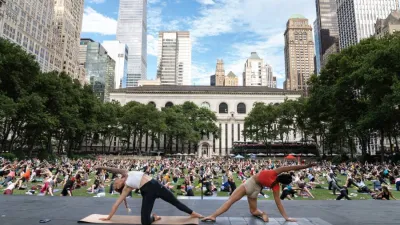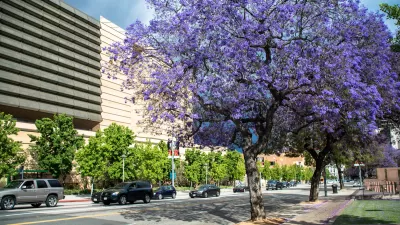A 50-year-old institution takes stock of placemaking in the public realm today.

Public space advocacy organization Project for Public Spaces has released a landmark report on the challenges and opportunities facing public space today. The report, which is based off of a survey of over 700 public space practitioners from around the world, marks the organization’s 50th anniversary.
The report shows that only 5 percent of practitioners believe that public spaces are meeting the needs of their communities. Instead, 63 percent said that they need improvement, and 32 percent reported that spaces are outright failing.
The report breaks down seven key takeaways from the survey:
- The funding systems for public space are broken
- Bureaucratic hurdles are blocking public space gains
- Public spaces are bearing the weight of the housing and homelessness crisis
- Physical, financial, and cultural barriers are blocking the public’s access to public spaces
- Public spaces are the antidote to the loneliness epidemic
- Public spaces are threatened by, but also critical for the adaptation to climate change
- Equitable development without displacement is key to placemaking as a force for good
“Much like parenting, successful placemaking requires an approach that puts the holistic care of a public space at the center, and wraps around resources and services that allow the caretakers to do their work well. Until we do this, our cities and towns will fail to unlock the full potential of our parks, streets, markets, public buildings, and other civic infrastructure,” the report states.
FULL STORY: The State of Public Space in 2025

Study: Maui’s Plan to Convert Vacation Rentals to Long-Term Housing Could Cause Nearly $1 Billion Economic Loss
The plan would reduce visitor accommodation by 25,% resulting in 1,900 jobs lost.

Alabama: Trump Terminates Settlements for Black Communities Harmed By Raw Sewage
Trump deemed the landmark civil rights agreement “illegal DEI and environmental justice policy.”

North Texas Transit Leaders Tout Benefits of TOD for Growing Region
At a summit focused on transit-oriented development, policymakers discussed how North Texas’ expanded light rail system can serve as a tool for economic growth.

How Community Science Connects People, Parks, and Biodiversity
Community science engages people of all backgrounds in documenting local biodiversity, strengthening connections to nature, and contributing to global efforts like the City Nature Challenge to build a more inclusive and resilient future.

Alabama: Trump Terminates Settlements for Black Communities Harmed By Raw Sewage
Trump deemed the landmark civil rights agreement “illegal DEI and environmental justice policy.”

Dear Tesla Driver: “It’s not You, It’s Him.”
Amidst a booming bumper sticker industry, one writer offers solace to those asking, “Does this car make me look fascist?”
Urban Design for Planners 1: Software Tools
This six-course series explores essential urban design concepts using open source software and equips planners with the tools they need to participate fully in the urban design process.
Planning for Universal Design
Learn the tools for implementing Universal Design in planning regulations.
City of Santa Clarita
Ascent Environmental
Institute for Housing and Urban Development Studies (IHS)
City of Grandview
Harvard GSD Executive Education
Toledo-Lucas County Plan Commissions
Salt Lake City
NYU Wagner Graduate School of Public Service




























